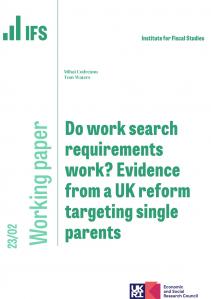This article was first printed by the Times newspaper on 4 July 2015 and has been reproduced here in full with permission.
The Labour leadership contenders are still debating the wisdom of tax and spending decisions their party took in what feels like a different world - the years before the financial crisis of 2008 and the associated recession.
It would be easy to dismiss this as an exercise in introspection best left to the opposition. But there are lessons to be learnt from that period that are just as important for the chancellor, George Osborne, as they are for the next leader of the Labour party.
Both sides need to look beyond the narrow question of how much was being borrowed to learn the right lessons. Yes, Britain was borrowing more than most comparable countries before the recession hit. And yes, the subsequent fiscal repair job might have been a little easier had less been borrowed. But that tells us little about what the “right” level of borrowing was then, and even less about what the right level is now and in the future.
The real lessons come from understanding something a bit deeper about what went wrong with economic policymaking. There was really no excuse for it because similar mistakes were made by Nigel Lawson in the late 1980s. And it is not obvious that George Osborne will be immune either. Many economic and political commentators have proved themselves equally prone to the same blunders.
The mistake can be summed up in one word: hubris. A belief that you know exactly what needs to be done to make the economy function and, worse, that you have succeeded. Nigel Lawson thought he had permanently improved the UK’s economic performance to the extent that he could afford massive tax cuts. He hadn’t. A huge fiscal deficit resulted in the early 1990s.
Gordon Brown appeared quite convinced he had abolished boom and bust. He kept telling us so. He hadn’t. We all know what happened next. There were many other symptoms of his hubris. One was the belief that running a significant deficit after more than a decade of continuous growth was safe. After all, if boom and bust had been abolished, it would have been. Another was putting in place a set of fiscal rules, then gaming them — massaging your own forecasts, moving the goalposts, spending “off balance sheet” to flatter the official numbers.
Some of these symptoms have been dealt with. The forecasts are now in independent hands. The fiscal rules have been made somewhat more sensible. There is less messing around with off balance sheet spending. But some warning signs are flashing.
After several recent budgets we at the Institute for Fiscal Studies have pointed to policy changes that bring in extra revenue in the short term, but weaken the public finances in the long run. Policies have been announced with definite costs that are to be paid for by measures that have decidedly uncertain revenues. We have had the absurdity of claims that selling assets such as the student loan book can be used to pay for permanent spending increases. And we have promises of massive spending on projects such as HS2 with no admission that other spending will have to suffer if it goes ahead.
Is there not just a faint whiff of hubris about a chancellor who talks about running continuous budget surpluses when he still has a massive job to do to get us into balance? Where is even the beginning of a blueprint for how that might work when we know that in the decades after 2019 there will need to be a massive further dose of spending cuts, or tax rises, if we are to meet the financial costs of an ageing population.
So the real lessons I take from Britain’s recent past are the need for humility; the need for honesty and transparency in economic policy making; the need for long-term planning to account for challenges we know about; and the need for policy making which is, where possible, robust and, where not, nimble, in the face of different economic outcomes.
For if there’s one thing we’ve learnt about the economy and public finances it is that nobody can accurately predict their future path. Not even chancellors.








